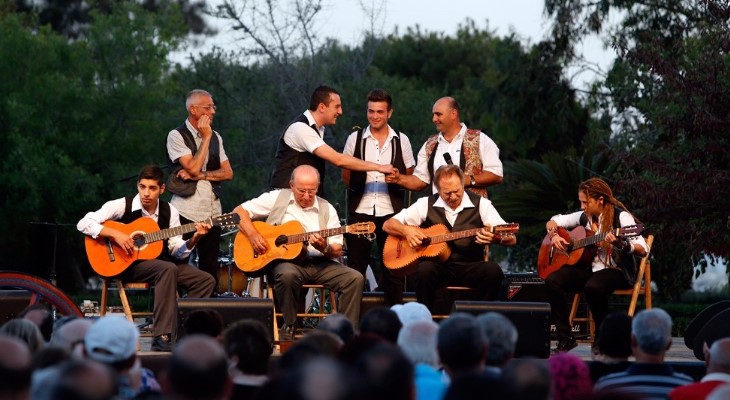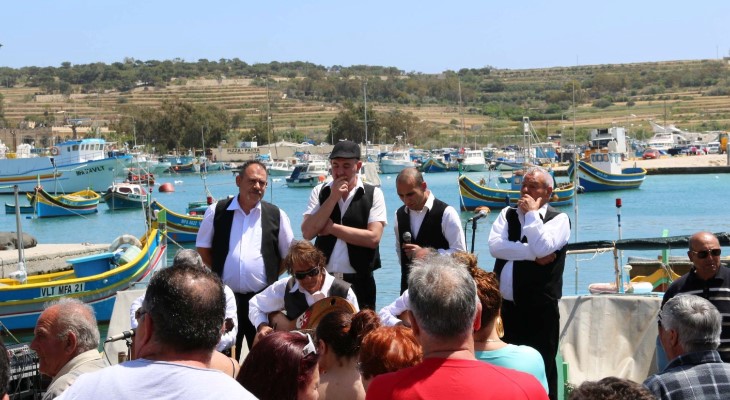Unscripted and spontaneous, ghana is a reflection of the island’s history, recounting the day-to-day life of the working classes.
Imagine the scene: a farmer is toiling in his field when he suddenly starts chanting a few rhyming verses to the farmer in the next field. Two housewives are hanging up the washing on the rooftop of their house while catching up with local village gossip by singing to each other. No, this is not a musical film I am describing. This is life in a rural village in 19th century Malta.
Folk singing, or ghana as it is called in Maltese (pronounced aana, the “gh” is silent), has always played an important part of local daily life. A mix of Sicilian ballads with Spanish and Moorish influences, ghana is of course, like everything else in our culture, a reflection of Malta’s geographic location and complex history.
And it was all spontaneous. The songs were created there and then, off the cuff, spirtu pront (as we say in Maltese), not pre-written or repeated in exactly the same way. This was the music of peasants, fishermen, and the working class men and women, of illiterate or poorly educated people with no musical training whatsoever but with an impressive natural ability to sing and rhyme. The songs are humorous, satirical, emotional, raw and honest but above all they are very, very clever.
Research reveals there are records of ghana singers being engaged to perform at nobility wedding feasts as far back as the second half of the 15th century, and there are 19th century books of ghana in Maltese, although it is unclear who would have read them as the ghana singers at that time were generally illiterate and certainly could not afford to buy books.
In the spirit of spontaneity, ghana could literally happen anywhere at any time. Street hawkers used to sing folk songs about their wares, housewives would sing in the communal wash-houses, someone would start singing in the street and someone else would respond.
This informal type of ghana was said to “evoke the very roots of Maltese poetry and literature”, according to Dr Philip Ciantar, senior lecturer in music at the University of Malta, while Malta’s national poet Rev. Karm Psaila (who penned the lyrics to the Maltese national anthem) links ghana to the “modest recreation and aspirations of the common people”.
However, all this spontaneity does not mean there are no rules. Maltese folk singing follows a very particular style and there are three forms of ghana known as “la Bormliza”, “tal-fatt” and “spirtu pront”. All are characterised by loud, strident singing, quite literally at the top of the singer’s lungs.

Ghanafest - Festivals Malta
The most commonly performed type of ghana these days is the “spirtu pront”, the quick-witted improvised rhyming duels of riposte and counter-riposte usually performed by either four or six singers accompanied by guitarists. This type of ghana is generally performed by men, and today you’ll find them singing in village bars or at certain parish festas such as Mellieha, Zejtun and Marsaxlokk, or festivals such as Mnarja on 29th June at Buskett Gardens. Hardly any women sing this type of ghana. “Spirtu pront” is so popular that it has now become synonymous with Maltese folk singing in general.
The rules state that the improvised ripostes must rhyme, and must be formulated in an 8, 7, 8, 7, syllabic structure and singers must use “high flown” language, an elaborate format making use of wit, double-entendre and Maltese proverbs and idiomatic phrases.
The la Bormliza type of ghana takes its name from the city of Bormla (Cospicua) where it was most popular and is sung in the highest register requiring the male singers to reach extraordinarily high soprano notes without breaking into falsetto. In fact it is also known as la nisa (singing like women). There is also the melancholic ghana tal-fatt (factual song), a ballad where the ghannej sings a story about a well known personality, event, a folk tale or legend.
The musical instrument of choice accompanying ghana is the guitar, which is thought to have been introduced in Malta as far back as the early 1600s. The guitar was one of those few traditional musical instruments that crossed the cultural divide and was used by both upper classes and peasants. Guitars for ghana were locally made. A smaller, waisted guitar called a pastardin was used for the prim, the lead guitarist, while a larger Spanish-style guitar was used for the accompaniment.

Ghanafest - Festivals Malta
Local folk guitarist Indri Brincat designed a guitar with an extended horn. This design became so popular that most ghana accompanists today choose to play either this or one of Indri’s other designed guitars. And eight years after his death, Indri’s guitars are still being produced, not just in Malta but also among the Maltese communities in Australia and the US.
It has to be said that despite the fact that ghana has such a long and deep-rooted heritage, in recent years it has been facing a steep decline. Only a small minority still perform ghana, and you won’t be hearing any spontaneous singing in the streets anymore, at least not of the ghana variety. For the remaining enthusiasts, ghana sessions take place every Sunday in wine bars in several villages, but these are never advertised in the media.
Still, the annual Għanafest which this year will be held at the newly refurbished Argotti Botanic Gardens in Floriana, is always well-attended which indicates that interest is still there. It’s also heartening to see that among the ghannejja there are a couple of women and even a small boy who sings with his grandfather.
As you may have gathere, ghana is very much based on the lyrics, which means that if you are to enjoy the experience to the full you’ll need to make friends with a local who can translate what the ghannejja are singing. A tall order I hear you mutter, but well worth it, as ghana is perhaps the richest expression of our local culture and heritage, and your Malta experience won’t be complete without it.
Ghanafest takes place at Argotti Botanic Gardens in Floriana on 22nd and 23rd June